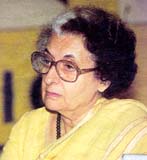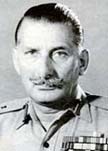Commentary/Mani Shankar Aiyar
Aamar sonar Bangla/Aamitomai bhalobashi.
This week, we celebrate the silver
jubilee of independent India's finest hour, the Liberation of
Bangladesh. I was 30 that year. There is no other year I would
rather have been 30. For I was old enough to be a participant.
And, yet, young enough to dream my dreams.
As Dhaka fell, I was
named secretary to a committee chaired by Sukhomoy Chakravarty
to organise emergency relief supplies to enable the incoming Government
of Bangladesh to take back and rehabilitate the refugees who had
fled in their millions to camps in India. I was, in that sense,
present at the creation.
 It was Indira Gandhi's finest hour. Whatever might be history's
eventual judgement on her, and however many reservations her contemporaries
might still have about her Emergency, in that first flush of victory
in December 1971, every Indian was of one view: Indiraji had done
us proud.
It was Indira Gandhi's finest hour. Whatever might be history's
eventual judgement on her, and however many reservations her contemporaries
might still have about her Emergency, in that first flush of victory
in December 1971, every Indian was of one view: Indiraji had done
us proud.
With consummate skill, she had manoeuvred the nation
through some of the most treacherous shoals we have ever travesed
and brought us across, like a true majhi, safe and secure, leaving
on the shore a fuming Kissinger and a stunned Nixon bemused,
bewildered, befuddled. Whether it was Cambodia or Bangladesh that
was Kissinger's worst hour is something of a historian's toss-up.
The lesson I have
learned is how dangerous it is to entrust the destiny of any nation
to these Harvard types!
The heroes of the hour were General Jagjit Singh Aurora and his
brigadier, Jack Jacob. At that momentous moment in history they belong
to the nation.
 Now, one belongs to the Akali Dal and the other to the BJP. Nevertheless,
they deserve the nation's gratitude. They can do no harm now sufficient
to obscure the tremendous boost they gave us that misty evening
25 years ago, when Niazi and Tikka Khan were brought to heel.
Now, one belongs to the Akali Dal and the other to the BJP. Nevertheless,
they deserve the nation's gratitude. They can do no harm now sufficient
to obscure the tremendous boost they gave us that misty evening
25 years ago, when Niazi and Tikka Khan were brought to heel.
Looming above his soldiers in the field was Sam Manekshaw, the
tallest of them all. India's one and only field marshal, still
as erect as ever, still as witty as ever, still as sensible as
ever.
If Indiraji had made him President in 1982, we might have
been spared the dreaful five years that followed in Rashtrapati
Bhavan -- and the even more dreadful Memoirs that have since emerged.
What an amazing contribution this microscopic community has made
to the nation: Dadabhoy Naoroji and Pherozeshah Mehta pioneered
our freedom movement; Jamshedjee Tata brought us into the vanguard
of industry; Homi Bhabha took us to the frontiers of science;
Sam Manekshaw sliced Pakistan in half. If we were to treat our
larger minorities with a tithe of the affection we reserve for
our smallest, we might still become Number One in the coming Asian
Century.
 I made my first trip to Bangladesh in January 1972. As the plane
swooped in to Tejgaon airport, I gazed down at the golden fields
below and hummed to myself the tune that had, over the previous
several months, become so familiar to all of us: Aamar sonar Bangla/Aami
tomai bhalobashi.
I made my first trip to Bangladesh in January 1972. As the plane
swooped in to Tejgaon airport, I gazed down at the golden fields
below and hummed to myself the tune that had, over the previous
several months, become so familiar to all of us: Aamar sonar Bangla/Aami
tomai bhalobashi.
Perhaps because ours was the first-ever
economic delegation to visit Bangladesh, or perhaps because he
wanted to stretch his legs, or perhaps even because he was so
fond of me, the acting high commissioner, J N Dixit, was at
the airport to greet us on arrival. Wickedly, his eyes twinkling,
he whispered to me that our economic delegation's slogan might
be: Aamar sona; tomar Bangla.
|





 It was Indira Gandhi's finest hour. Whatever might be history's
eventual judgement on her, and however many reservations her contemporaries
might still have about her Emergency, in that first flush of victory
in December 1971, every Indian was of one view: Indiraji had done
us proud.
It was Indira Gandhi's finest hour. Whatever might be history's
eventual judgement on her, and however many reservations her contemporaries
might still have about her Emergency, in that first flush of victory
in December 1971, every Indian was of one view: Indiraji had done
us proud.
 Now, one belongs to the Akali Dal and the other to the BJP. Nevertheless,
they deserve the nation's gratitude. They can do no harm now sufficient
to obscure the tremendous boost they gave us that misty evening
25 years ago, when Niazi and Tikka Khan were brought to heel.
Now, one belongs to the Akali Dal and the other to the BJP. Nevertheless,
they deserve the nation's gratitude. They can do no harm now sufficient
to obscure the tremendous boost they gave us that misty evening
25 years ago, when Niazi and Tikka Khan were brought to heel.
 I made my first trip to Bangladesh in January 1972. As the plane
swooped in to Tejgaon airport, I gazed down at the golden fields
below and hummed to myself the tune that had, over the previous
several months, become so familiar to all of us: Aamar sonar Bangla/Aami
tomai bhalobashi.
I made my first trip to Bangladesh in January 1972. As the plane
swooped in to Tejgaon airport, I gazed down at the golden fields
below and hummed to myself the tune that had, over the previous
several months, become so familiar to all of us: Aamar sonar Bangla/Aami
tomai bhalobashi.